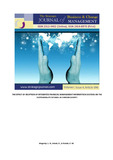THE EFFECT OF ADOPTION OF INTEGRATED FINANCIAL MANAGEMENT INFORMATION SYSTEMS ON THE SUSTAINABILITY OF NGOs IN NAIROBI COUNTY
Abstract
This study aimed at establishing the effect of adoption of integrated financial management systems on the
sustainability of Non-Governmental Organizations in Nairobi County. The study was guided by the resource
based view theory and was anchored on a positivist paradigm philosophy. The study employed descriptive
research design. Out of a target population of 1000 senior project managers and chief executives, a sample
of 285 was obtained using stratified random sampling. Primary data was collected from sampled officers
using structured questionnaires, while secondary data was obtained from the audited financial statements of
the NGOs and publications by the NGO coordination board. 172 questionnaires were found to be
satisfactorily completed for analysis yielding a 60.35% response rate. The data collected was analyzed using
descriptive and inferential statistics and it was presented in tables and charts. Statistical Package for Social
Scientists (SPSS) was used for data handling and analysis. The descriptive statistics included frequencies,
percentages, means and modes, while modelling and inferential statistics included regression and Correlation
analysis, Chi square tests and Analysis of Variance (ANOVA). Normality of the response variable (NGO
sustainability) data was confirmed using the Shapiro-Wilks test. The study showed that adoption of IFMIS
have significant effect on NGO sustainability more so on current ratio and survival ratio. The study concluded
that the adoption of IFMIS had enhanced the effectiveness and efficiency in the running of NGOs in Nairobi
County and made significant contribution towards managerial support, reduced the data processing costs,
reduced possibilities of misappropriation of funds and facilitated remote access which was necessary for
effective monitoring and evaluation. The study recommended that the NGOs should be encouraged to adopt
the IFMIS in order to improve their efficiency and effectiveness in financial management and financial
reporting which is critical factor to the NGO growth and sustainability.
URI
http://strategicjournals.com/index.php/journal/article/download/1871/1790http://hdl.handle.net/123456789/5566
Collections
- Journal Articles (BE) [333]

